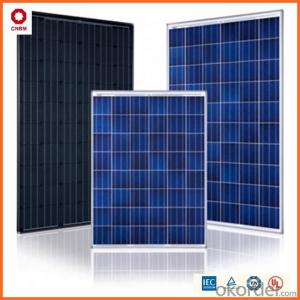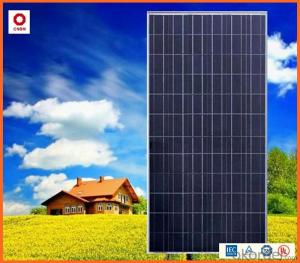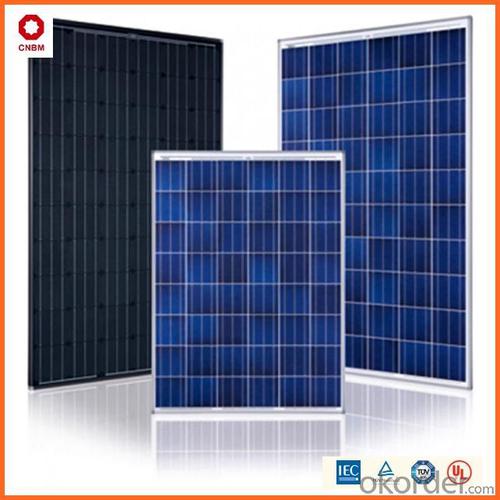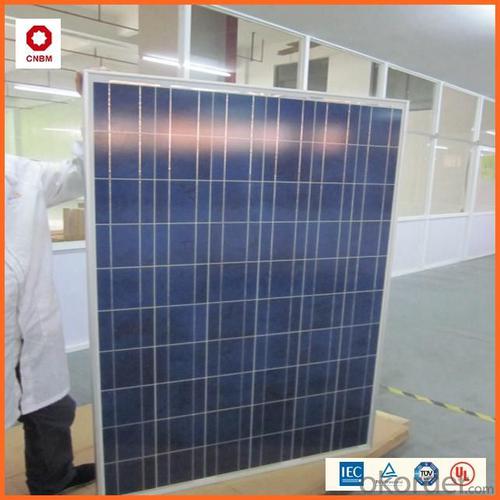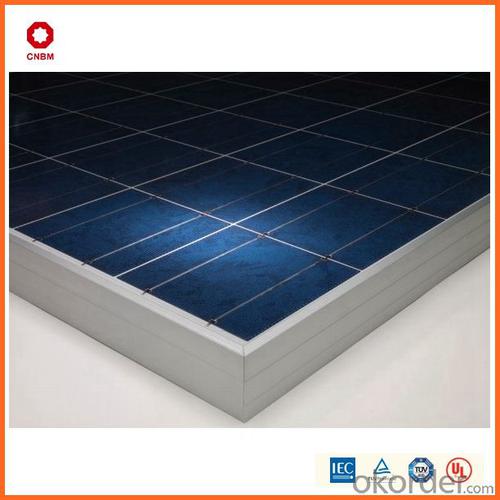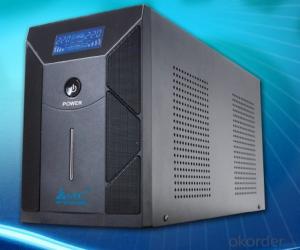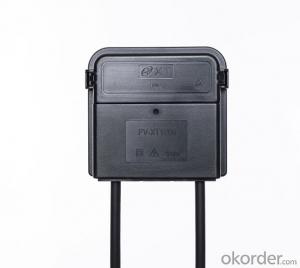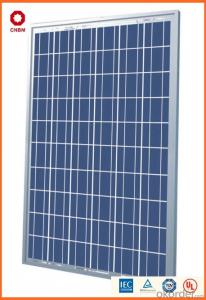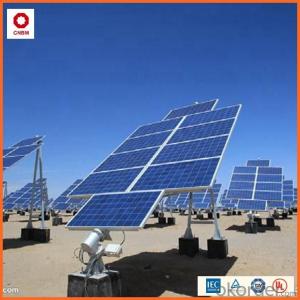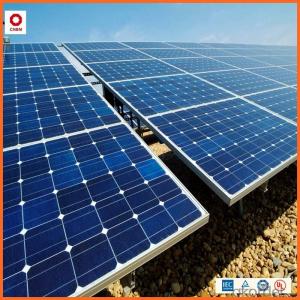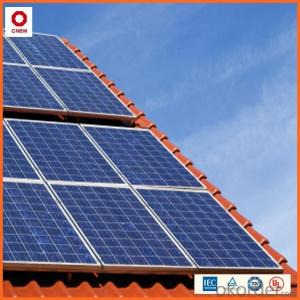Solar Energy Systems Spain ☆☆☆stock on sale 255w poly solar panel 0.45/w!!!!☆☆☆ a grade good quality
- Loading Port:
- China main port
- Payment Terms:
- TT OR LC
- Min Order Qty:
- 1 watt
- Supply Capability:
- 10000000 watt/month
OKorder Service Pledge
OKorder Financial Service
You Might Also Like
Product Description:
Hot Sale !!! Quality and Safety of 245w-320w Poly Solar Panel
1. Rigorous quality control meets the highest international standards.
2. High-transmissivity low-iron tempered glass, strong aluminium frame.
3. Using UV-resistant silicon.
4. IS09001/14001/CE/TUV/UL
Warranties of 245w-320w Poly Solar Panel
1. 10 years limited product warranty
2. 15 years at 90% of the minimal rated power output
3. 25 years at 80% of the minimal rated power output
Technical date of 245w-320w Poly Solar Panel
ITEM NO.: | Mono 125*125 cell ,36pcs . Power range from 80Wp-100Wp | ||||||||
Maximum Power(W) | 80 | 85 | 90 | 95 | 100 | ||||
Optimum Power Voltage(Vmp) | 17.81 | 17.89 | 17.94 | 17.99 | 18.06 | ||||
Optimum Operatige Current(Imp) | 4.78 | 4.91 | 5.12 | 5.35 | 5.59 | ||||
Open Circuit Voltage(Voc) | 21.98 | 22.05 | 22.14 | 22.28 | 22.45 | ||||
Short Circuit Current(Isc) | 4.95 | 5.15 | 5.36 | 5.65 | 5.84 | ||||
Solar Cell: | 125*125 Mono | ||||||||
Number of Cell(pcs) | 4*9 | ||||||||
Brand Name of Solar Cells | JA Cell, Bluesun Cell | ||||||||
Size of Module(mm) | 1580*808*35 | ||||||||
Caple & Connector Type | Pass the TUV Certificate | ||||||||
Frame(Material Corners,etc.) | Aluminium-alloy | ||||||||
Backing (Brand Type) | TPT | ||||||||
Cell Efficiency for 100W(%) | 15.8% | ||||||||
Weight Per Piece(KG) | 12.0KG | ||||||||
FF (%) | 70-76% | ||||||||
Junction Box Type | Pass the TUV Certificate | ||||||||
Tolerance Wattage(e.g.+/-5%) | ±3%, or 0-3% | ||||||||
Front Glass Thikness(mm) | 3.2 | ||||||||
Temperature Coefficients of Isc(%) | +0.04 | ||||||||
Temperature Coefficients of Voc(%) | -0.38 | ||||||||
Temperature Coefficients of Pm(%) | -0.47 | ||||||||
Temperature Coefficients of Im(%) | +0.04 | ||||||||
Temperature Coefficients of Vm(%) | -0.38 | ||||||||
Temperature Range | -40°C to +85°C | ||||||||
Surface Maximum Load Capacity | 2400Pa | ||||||||
Allowable Hail Load | 23m/s ,7.53g | ||||||||
Bypass Diode Rating(A) | 12 | ||||||||
Warranty | 90% of 10 years,80% of 25 years. | ||||||||
Standard Test Conditions | AM1.5 1000W/ 25 +/-2°C | ||||||||
Packing | carton or pallet | ||||||||
1*20' | 25 Pallets / 450pcs | ||||||||
1*40'STD | 25 Pallets / 100pcs | ||||||||
Features of our products:
• High conversion efficiency mono/poly-crystalline amorphous silicon solar cells
• Modules incorporate high performance bypass diodes to minimize the power drop caused by shading
• High transmittance, low-iron tempered glass
• High performance EVA encapsulant to prevent destroying and water.
• AI frame: without screw, corner connection. 8 holes on the frame can be installed easily
• Good performance of preventing from atrocious weather such as wind and hails
• Certifications: CE IEC TUV VDE UL, Class I
• 10 years 90% power output warranty

Shipping of 245w-320w Poly Solar Panel
By Sea | Delivery from Shanghai or Ningbo seaport |
By Air | Departure from Shanghai Pudong Airport |
By Express | Post by DHL, EMS, UPS, TNT. |
- Q: How do solar energy systems impact the reliability of the electricity grid?
- Solar energy systems can positively impact the reliability of the electricity grid by diversifying the energy sources. As solar power is a renewable and abundant resource, it can help reduce reliance on traditional fossil fuel-based power generation, thereby enhancing grid stability. Additionally, distributed solar installations can reduce strain on the transmission infrastructure and decrease the risk of blackouts by providing power closer to where it is consumed. However, intermittent nature of solar energy may require effective grid management and energy storage solutions to ensure consistent power supply during periods of low sunlight.
- Q: Are there any risks of electrical short circuits with solar energy systems?
- Solar energy systems, like any other electrical system, have the potential for electrical short circuits. When there is an unintended path of low resistance, a short circuit occurs and allows a large amount of current to flow. This can be caused by faulty wiring, damaged components, or improper installation. Short circuits can lead to overheating, electrical fires, or system damage. The excessive current flow can melt wires, burn insulation, and even harm the solar panels themselves. In extreme cases, short circuits can cause explosions or other dangerous situations. To reduce the risks of short circuits, it is crucial to have qualified professionals install the system according to safety guidelines and local codes. Regular maintenance and inspections are also important for identifying and addressing potential issues. Installing a circuit breaker or fuse within the system can automatically disconnect the circuit in case of a short circuit. Using high-quality components and wiring specifically designed for solar energy systems can also help minimize the risks of short circuits. It is important to follow the manufacturer's instructions and guidelines for system maintenance and operation. In conclusion, although there are risks of electrical short circuits with solar energy systems, these risks can be effectively managed and minimized through proper installation, regular maintenance, and adherence to safety guidelines.
- Q: Can a solar energy system be installed on a concrete roof?
- Yes, a solar energy system can be installed on a concrete roof. In fact, concrete roofs are one of the most ideal surfaces for solar panel installation. Concrete roofs are typically flat, stable, and durable, providing a solid foundation for the panels. Additionally, concrete roofs often have ample space and are not obstructed by nearby trees or buildings, allowing for maximum sunlight exposure. The installation process involves securing the panels to the concrete roof using special mounting systems designed to withstand the weight and ensure a secure attachment. Overall, concrete roofs are a great choice for solar energy system installation.
- Q: Can solar energy systems be used in powering hotels or resorts?
- Yes, solar energy systems can certainly be used to power hotels or resorts. Solar power is a clean and renewable energy source that can provide ample electricity to meet the energy demands of hotels and resorts. These establishments typically require a significant amount of energy for various purposes such as lighting, heating, cooling, and operating electrical appliances and equipment. Installing solar panels on the rooftops or in open areas of hotels and resorts can allow them to harness the abundant sunlight and convert it into electricity. This electricity can be used to power the entire facility, reducing the reliance on traditional energy sources and lowering the carbon footprint. In addition to being environmentally friendly, solar energy systems can also provide financial benefits to hotels and resorts. By generating their own electricity, these establishments can reduce or even eliminate their utility bills, resulting in substantial cost savings over time. Moreover, some countries offer incentives, grants, or tax credits for implementing solar power systems, further enhancing the economic viability of such installations. Furthermore, the availability of solar energy is not limited to sunny days. With advancements in technology, solar panels can still generate electricity even during cloudy or overcast conditions. Additionally, excess energy produced during peak sunlight hours can be stored in batteries for later use, ensuring a consistent power supply throughout the day and night. By adopting solar energy systems, hotels and resorts can showcase their commitment to sustainability and environmental responsibility. This can be a valuable marketing tool, attracting eco-conscious guests who prefer environmentally friendly accommodations. It also aligns with the growing trend of sustainable tourism, which can enhance the reputation and competitiveness of these establishments in the industry. Overall, solar energy systems are a viable and efficient solution for powering hotels and resorts. They offer numerous benefits, including reduced utility costs, environmental sustainability, and enhanced market appeal. As the technology continues to evolve and become more affordable, more and more hotels and resorts are embracing solar power as a clean and reliable energy source.
- Q: Can solar energy systems be used for water heating?
- Yes, solar energy systems can definitely be used for water heating. Solar water heaters use the sun's energy to heat water for various domestic and industrial purposes. They are cost-effective, environmentally friendly, and can significantly reduce energy consumption and utility bills.
- Q: How do solar energy systems impact the stability of the electricity grid?
- Solar energy systems can have both positive and negative impacts on the stability of the electricity grid. On one hand, solar energy systems can reduce strain on the grid by generating electricity during peak demand times, thus reducing the need for additional power sources and enhancing grid reliability. On the other hand, the intermittent nature of solar power can pose challenges to grid stability, as sudden fluctuations in solar generation can impact the balance between electricity supply and demand. However, with the integration of advanced technologies, such as energy storage systems and smart grid management, these challenges can be effectively mitigated, ensuring a stable and resilient electricity grid system.
- Q: What is net metering?
- Net metering is a billing arrangement that allows solar panel owners to receive credit for the excess electricity they generate and feed back into the grid. This means that when their solar panels produce more electricity than they need, the surplus is sent to the grid, effectively spinning their energy meter backwards and reducing their future electricity bills.
- Q: Can a solar energy system be installed on a green roof?
- Yes, a solar energy system can be installed on a green roof. In fact, combining solar panels with a green roof can have several benefits. A green roof provides insulation, reduces stormwater runoff, and helps mitigate the urban heat island effect. By installing solar panels on a green roof, the panels can benefit from the cooling effect of the vegetation, resulting in improved energy production and efficiency. Additionally, the green roof can provide shade to the solar panels, reducing the risk of overheating and extending their lifespan. It is important to ensure that the structural integrity of the roof can support both the weight of the green roof and the solar panels, and proper installation and maintenance are crucial to ensure the success and longevity of the system.
- Q: Can solar energy systems be used for powering electric boats or ships?
- Yes, solar energy systems can be used to power electric boats or ships. Solar panels can be mounted on the surface of the vessel to capture sunlight and convert it into electricity. This renewable energy source can then be used to power the boat's propulsion systems and onboard electrical equipment, reducing reliance on fossil fuels and minimizing environmental impact.
- Q: Do solar energy systems require a backup battery system?
- Depending on your specific needs and circumstances, it may be beneficial to have a backup battery system for your solar energy system. Solar energy systems generate electricity from the sun and can be connected to the grid, allowing excess energy to be sold back to the utility company. This means that even during times when the sun is not shining, such as at night or during cloudy weather, you can still draw electricity from the grid. However, there are several advantages to having a backup battery system. Firstly, it enables you to store excess energy generated during the day for use at night or during power outages. This ensures a reliable source of electricity even when the grid is down. Moreover, a backup battery system provides a more consistent power supply. When connected to the grid, solar energy systems typically shut down during power outages to protect utility workers. But with a backup battery system, you can continue powering your essential appliances and devices during these outages. Additionally, having a backup battery system promotes energy independence. By storing your own energy, you can reduce dependence on the grid and potentially further offset electricity bills. Ultimately, the decision to install a backup battery system for your solar energy system depends on your specific energy needs, budget, and preferences. Seeking guidance from a solar energy professional can help you determine the best solution for your situation.
Send your message to us
Solar Energy Systems Spain ☆☆☆stock on sale 255w poly solar panel 0.45/w!!!!☆☆☆ a grade good quality
- Loading Port:
- China main port
- Payment Terms:
- TT OR LC
- Min Order Qty:
- 1 watt
- Supply Capability:
- 10000000 watt/month
OKorder Service Pledge
OKorder Financial Service
Similar products
Hot products
Hot Searches
Related keywords
